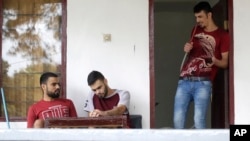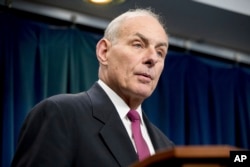U.S. President Donald Trump's decision to block entry to the U.S. for citizens of seven Muslim majority nations has sparked a huge popular backlash, but the policy that stands to affect even more people is his 120-day suspension of all refugee resettlement in the United States.
The presidential executive order, issued last week, calls for the suspension of visas and other immigration benefits to citizens of Iraq, Syria, Iran, Libya, Somalia, Sudan and Yemen. Those countries were named in a 2016 law concerning immigration visas as "countries of concern." It also suspends the U.S. Refugee Admissions Program for 120 days, while officials reevaluate its procedures, and limits the number of refugees that may be admitted to the United States to 50,000 within the 2017 fiscal year, the 12-month period that ends on September 30.
One group that is particularly distressed by the suspension is the 14,000 refugees and asylum seekers in Indonesia. The United States was the biggest recipient of Indonesia's displaced peoples, the vast majority of whom are Muslims.
"In 2016 alone there were 790 people resettled to the United States," said Febi Yonesta, chairman of SUAKA, the Indonesian Civil Society Network for Refugee Rights Protection. "If Trump's policy continues, Indonesia's displaced population will get seriously backed up."
Aggravating that phenomenon is the Indonesian president's recent decree recognizing refugees and asylum seekers, which some feel will increase the flow of refugees and migrants to the island nation. Indonesia is not a signatory to the 1951 U.N. Convention on refugees, so it functions as a point of transit until they are resettled by the UNHCR in a third country, which can take up to ten years.
The American promise
"For decades, the United States has been a global leader in refugee protection, a tradition rooted in the tolerance and generosity of the American people," said Mitra Salima Suryono of UNHCR Indonesia. "We hope that this suspension is temporary and that the U.S. will continue its strong leadership role in protecting those who are fleeing conflict and persecution."
She said resettlement is a sign of "tangible solidarity" with major refugee-hosting countries like Indonesia, which shoulder the brunt of the displacement crisis despite having far less resources and GDP than developed countries.
"In Indonesia, refugees of various nationalities who are fleeing for their lives and in need of protection are affected by the suspension….some of their cases have been accepted while others are going through vetting and other clearances," said Suryono. "Many have been making plans to rebuild their lives in the U.S. after years of waiting in refugee camps or precarious urban situations." They are worried, shocked, and afraid, she said.
The top three countries of origin for refugees and asylum seekers in Indonesia are Afghanistan, Myanmar, and Somalia, with Afghans accounting for roughly half. Nearly all of them are Muslim, and those from Myanmar tend to be Rohingya fleeing genocide in Myanmar, who have been described as the "most persecuted minority in the world."
U.S. Homeland Security chief John Kelly has downplayed the impact of the travel restrictions, insisting the move does not represent a travel ban, but a "temporary pause that allows us to review the existing refugee and vetting system."
Devastating one-two punch
For Mohamed Rasool Bagherian, an Iranian refugee who has been in Jakarta for six years, Trump's orders are a devastating one-two punch. Iran is one of seven Muslim countries from where travel has been restricted under the pretext of curbing terrorism. Ironically, he, his wife, and eight-year-old son are all Christian.
"Three years ago, Australia closed its doors on our family when they stopped accepting maritime refugees," Bagherian told VOA. "This year, America has done the same." Bagherian said that his family was on the UNHCR's list of people to be resettled in the United States as of last year.
"We left Iran when my son was just a baby; he was the only thing we could take with us," said Bagherian, speaking near his temporary home in North Jakarta. "He's not allowed to even attend school in Indonesia. We just want a better life for him."
The new U.S. policies make ostensible concessions for Christians like the Bagherians, but it is quite difficult to prove such affiliations. "Look, my name is Mohamed," he cracked. "It's an uphill battle."
Mixed messages from the government
Indonesia's official reaction to Trump's actions have focused more on terrorism and the travel ban than on refugees.
"We are not affected by the policy. Why fret?" said President Joko Widodo in a radio address on Monday, referring to the fact that Indonesia is not one of the seven countries targeted by the travel restrictions.
Indonesia's Foreign Ministry expressed concern about the ban, but focused on how it may hurt global efforts to fight terrorism.
Human rights experts were more concerned. "Word of mouth spreads pretty fast among these persecuted people," said Andreas Harsono, a researcher with Human Rights Watch in Jakarta. Now that there is a "legal framework" for refugees and asylum seekers in Indonesia, more refugees will try and come here, he said, and Trump's ban on resettlement has particularly bad timing.
Refugees in Indonesia retained hope that they would eventually make their way to the United States.
"In my country, girls can't even work, but in America you can do anything," said an Afghan Hazara teen who lives West Java. She didn't want to be identified for fear it could hurt the transit process for her family of five, which was on track for UNHCR resettlement to the United States this year. But now she says their status is unclear.
"I still think the American people are the best in the world," said Bagherian. "This is not the citizens' fault. It is the president. I hope he will realize his mistake and change this."





